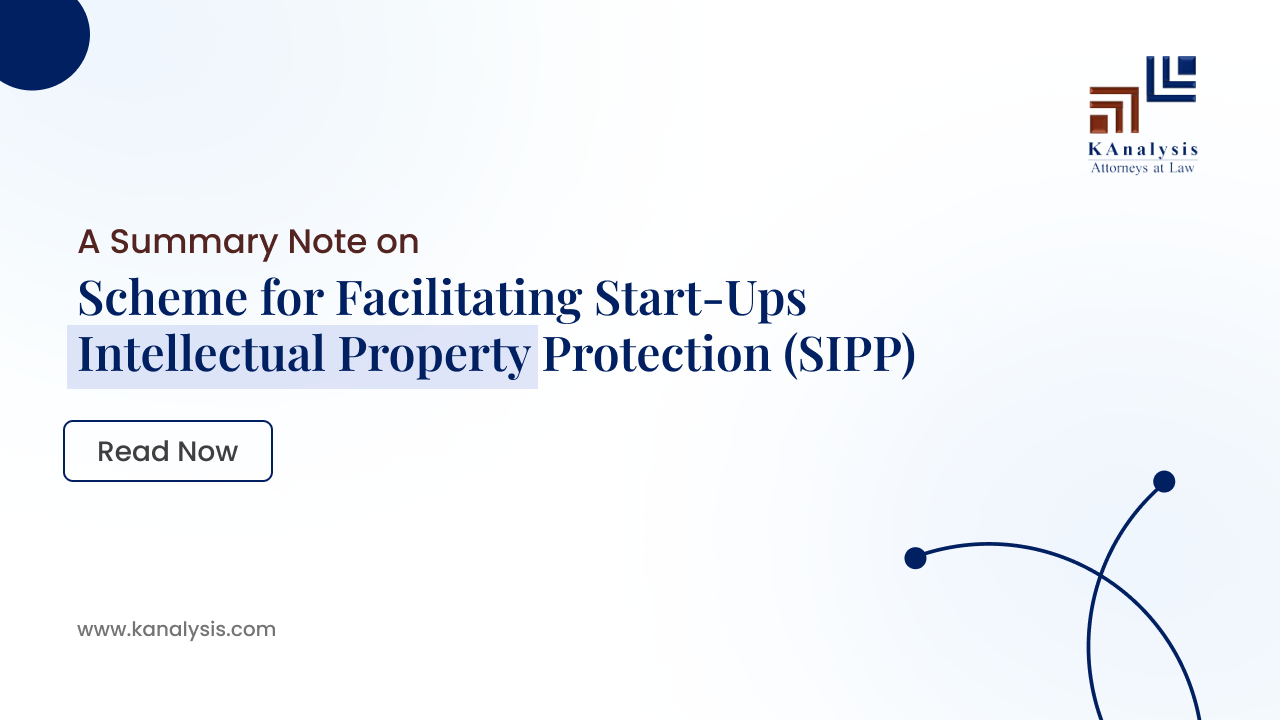Department for Promotion of Industry and Internal Trade (DPIIT) recently via notification dated 02.11.2022 notified an extension of SIPP Scheme for 3 years and revised Scheme for Facilitating Start-Ups Intellectual Property Protection (‘SIPP Scheme’ or ‘Scheme’).
The Scheme was launched to encourage start-ups protect and promote their Intellectual Property Rights (IPR) and thus encourage innovation and creativity among entrepreneurs. The Scheme was started on a pilot basis in January 2016 and was in force up to March 2020. The Scheme via above-mentioned notification is now being extended further for a period of three years that is up to March 31, 2023.
We are sharing herewith a detailed note on the Scheme covering all important pointers:
Objective of the SIPP
- The primary objective of the SIPP is to promote awareness and acquire of IPR among the start-ups.
- The Scheme also aims to nurture and mentor innovative and emerging technologies among start-ups
- To assist start-ups in protecting and commercialize IPR by providing access to high-quality (Intellectual Property) IP services and resources.
SIPP Benefits for Start-Ups
- To promote awareness and encourage IPR protection amongst start-ups;
- Start-ups can avail patent, trademark, and design services by paying only required statutory fees and professional fees are excluded as part of the SIPP scheme;
- The Government would pay nominal professional fees for the services related to procuring the IPR to the advocates or patent and trademark agents in charge of handling the IPR process;
- Start-ups can avail a complete start-to-end array of services under this SIPP scheme, including general advice, assistance in drafting applications, preparing and filing responses to examination reports, appearing at hearings, contest oppositions and ensuring the final disposal of the IPR applications;
- For effective implementation of the Scheme, the DPIIT has empanelled several facilitators, who are required to provide IPR related services to start-ups;
- As per the scheme, facilitators will not charge anything from start-ups. The fees are paid directly by the government.
As per the revised guidelines, the start-ups enrolled under this scheme will not be required to obtain a certificate of an eligible business from the Inter-Ministerial Board of Certification.
Start-Ups Eligibility Criteria for SIPP
To avail the benefit of the SIPP scheme, companies have to be recognized as start-ups by the DPIIT under the ‘Start-Up India’ initiative. Start-ups recognized by DIPP can avail IPR related benefits, such as the SIPP scheme.
The start-up must meet the following eligibility criteria to avail the DPIIT Certificate of Recognition:
- The period of existence and operations of the tart-ups should not exceed 10 years from the date of formation;
- The DPIIT Certificate of Recognition is provided for the start-ups which is incorporated as a Private Limited Company, a Limited Liability Partnership (LLP), or a Registered Partnership Firm;
- The entity should have an annual turnover of Rs. 100 crores for any of the financial years since its federation;
- To get DPIIT Certificate of Recognition, the company should not have been incorporated by splitting up or recreating an already existing entity;
- The entity should be working towards the development of a product, process, or service;
- The entity should have a scalable business model with high potential for the creation of wealth and employment. The firm should have the potential to generate employment or create wealth;
- The Certificate of Recognition given by DPIIT may be verified from the ‘Start-Up India’ web portal;
- The start-ups covered under this scheme will not be required to obtain a certificate of an eligible business from the Inter-Ministerial Board of Certification;
- However, start-ups will be required to give a self-declaration that they have not availed funds under any other Government scheme to pay the facilitator, patent agent, trademark agent for filing, and prosecute their IP application.
Empanelment of Facilitators
For effective implementation of the Scheme, the DPIIT has empanelled several facilitators, who are required to provide IPR related services to start-ups. As mentioned above, the facilitators should not charge anything from the start-ups and the fees are paid directly by the government.
The facilitators will be empanelled by the Controller General of Patents, Designs and Trade Marks (CGPDTM). The CGPDTM will revise the list of eligible facilitators for the SIPP Scheme from time to time. The start-ups can check the list of facilitators from the official website of DPIIT.
Eligible Facilitator
- Any Trademark Agent registered with the CGPDTM;
- Any Patent Agent registered with the CGPDTM;
- Any Advocate as defined under The Advocates Act, 1961 who is entitled to practice law as per the rules laid down by Bar Council of India, who is well-versed with the provisions of the relevant Acts and Rules, and is actively involved in filing and disposal of applications for trademarks;
- A government department, organization, agency or CPSU (like TIFAC, NRDC, BIRAC, MeitY, CSIR, Patent Information Centers (PICs) through an authorized representative; and Technology and Innovation Centers (TISCs).
However, it is to be clarified that the IP application has to be signed by a person authorized to do so under the provisions of the relevant Act and Rules.
Responsibility for Facilitators
Facilitators will be responsible for the following functions as per the Scheme for SIPP.
- Facilitators will have to give general advisory on different IPR to start-ups on pro bono basis;
- Providing information on protecting and promoting IPRs to start-ups in other countries on pro bono basis;
- The facilitator will assist in filing and disposal of the IP applications related to patents, trademarks and designs at the national IP offices under the CGPDTM;
- Drafting provisional and complete patent specifications for inventions of start-ups;
- The facilitator is required to prepare and file responses to examination reports and other queries, notices or letters by the IP office;
- Appearing on behalf of the start-ups at hearings;
- Contesting opposition, if any, by other parties;
- Ensuring final disposal of the IPR application.
Duration of the SIPP Scheme
As mentioned above, the SIPP Scheme shall be applicable for 3 years with effect from 1st April 2020.
Fees for Patents, Designs, and Trademarks Application
The fee structure tabulated here will be applicable for any number of patents, trademarks, or designs that may be applied for by a start-up.
The facilitator will not charge anything from the start-up or the entrepreneur, and these fees will be paid directly to the facilitator by the Government through the office of the CGPDTM and disbursed by the respective IP office.

Statutory Fees
The startup needs to pay the statutory fees for patent, trademark, or design applied.
Procedure for filing application for Patents, Designs, and Trademarks
In respect to the Scheme, the procedure to be adopted for applying for Patents, Designs, and Trademarks is as follows:
Procedure for Patent Application
The start-ups willing to file a patent application can select the facilitator and the list of facilitators are available on the official website of CGPDTM.
Start-ups can contact him/her directly for the preparation of the SIPP Scheme application. If start-ups are unable to select a facilitator, it may contact the head office of the respective patent officer to get 3 names of facilitators, and select the name of the facilitator from the three.
The facilitator after assessing all the aspects as per Patents Act and Rules will file a complete patent specification at the appropriate Patent Office on behalf of the start-ups as per jurisdiction by following the prescribed procedure under the Patent Act and Rules.
Fee for filing a patent application and other statutory fees will be borne from the start-ups.
After a patent application is received by the Patent Office, the facilitator can submit the claim for fees as per the fee schedule mentioned above. Furnish the following documents for fee reimbursement.
- A letter addressed to the Head of Office of the respective Patent Office;
- Claimed fee for the drafting of the application;
- ID proof as a Registered Patent Agent;
- Invoice.
The Head of Office will verify the ID of the facilitator and ascertain the suitability of payment and arrange for the payment of a fee to the facilitator after receiving the claim from the facilitator.
Simultaneously with making the payment to the facilitator, the Head of Office will forward to the Office of the CGPDTM the details of the application and payment made to the facilitator.
The facilitator shall monitor and perform further steps of proceedings of start-up’s patent application, prepare the reply to any query from Patent Office, attend the hearings.
Designs Application
For filing and processing applications for designs, the list of facilitators for Patents will be applicable. The procedure for claiming the fees by the facilitator, application processing will be carried out as per the designs Act and Rules, as elaborated above.
Trade Marks Application
For filing and processing applications for trademarks, the list of Facilitators for Trademarks will be applicable. After filing a trademark application for a start-up as per the Trade Marks Act and Rules, the facilitator can submit the claim for payment of fees to the respective Head of Office of the Trade Marks Registry who will follow the same procedure as mentioned above.


